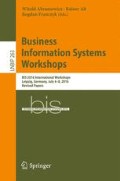Abstract
Managing energy production and consumption on a city level is an important, yet challenging task, since an increasing number of volatile renewable energies are being connected to the grid. Smart city energy management platforms could constitute a powerful tool for the involved market actors to effectively integrate renewable energies and thereby to refine existing business models. However, the implementation of such energy management tools is often hindered by privacy concerns or the lack of awareness about connected business benefits. In this paper, we present the concept for a decision support system that is tested in two pilot cities in Croatia and Bulgaria. Furthermore, we present a framework for the identification of the business benefits that are connected with the implementation of such a tool.
Access this chapter
Tax calculation will be finalised at checkout
Purchases are for personal use only
References
Scholz, R., Beckmann, M., Pieper, C., Muster, M., Weber, R.: Considerations on providing the energy needs using exclusively renewable sources. energiewende in Germany. In: Renewable and Sustainable Energy Reviews, vol. 35, pp. 109–125 (2014)
Cities, Towns and Renewable Energy: Yes in My Front Yard. International Energy Agents (IEA) (2009)
Watson, R.T., Boudreau, M.-C., Chen, A., Huber, M.H.: Green is: building sustainable business practices. Information Systems (2008)
Stromback, J., Dromacque, C., Yassin, M.H.: The potential of smart meter enabled programs to increase energy and systems efficiency: a mass pilot comparison. A Report for the European Smart Metering Industry Group (2011)
McHenry, M.P.: Technical and governance considerations for advanced metering infrastructure/smart meters: technology, security, uncertainty, costs, benefits, and risks. Energy Policy 59, 834–842 (2013)
Strüker, J., van Dinther, C.: Demand response in smart grids: research opportunities for the IS discipline. In: 18th Americas Conference on Information Systems (AMCIS) Proceedings, Seattle, Washington, 9–11 August 2012
Jurado, S., Fernandez, A., Avellana, N., Oates, M., Müller, G., Perse, T.: Tailoring the next generation energy management tool for smart cities. Sustainable Built Environment (2016)
Boer, P.F.: The Valuation of Technology: Business and Financial Issues in R&D. Wiley, New York (1999)
Curtin, J.P.. Gaffney, R.L., Riggins, F.J.: The RFID e-valuation framework – determining the business value from radio frequency identification. In: Proceedings of the 42nd Hawaii International Conference on System Sciences (2009)
Lee, H., Özer, Ö.: Unlocking the value of RFID. Prod. Oper. Manage. 16(1), 40–64 (2007)
Laubacher, R., Kothari, S.P., Malone T.W., Subirana, B.: What is RFID worth to your company? MIT Sloan School Paper #224, Cambridge, USA (2006)
Baars, H., Gille, D., Strüker, J.: Evaluation of RFID applications for logistics: a framework for identifying, forecasting and assessing benefits. Eur. J. Inf. Syst. 18(6), 578–591 (2009)
Feuerriegel, S., Neumann, D.: Measuring the financial impact of demand response for electricity retailers. Energy Policy 65, 359–368 (2014)
Scholl, H.J., AlAwadhi, S.: Smart governance as key to multi-jurisdictional smart city initiatives: the case of the eCityGov Alliance. Social Science Information (2016)
Römer, B., Reichhardt, P., Kranz, J., Picot, A.: The role of smart metering and decentralized electricity storage for smart grids: the importance of positive externalities. Energy Policy 50, 486–495 (2012)
Acknowledgments
The research presented in this article is funded by the FP7 framework’s ICT-2013.6.4 Optimising Energy Systems in Smart Cities, project iURBAN (www.iurban-project.eu), under grant agreement number 608712.
Author information
Authors and Affiliations
Corresponding author
Editor information
Editors and Affiliations
Rights and permissions
Copyright information
© 2017 Springer International Publishing AG
About this paper
Cite this paper
Reichert, S., Strüker, J. (2017). Assessment of Business Benefits for the Operation of a Smart City Energy Management Platform. In: Abramowicz, W., Alt, R., Franczyk, B. (eds) Business Information Systems Workshops. BIS 2016. Lecture Notes in Business Information Processing, vol 263. Springer, Cham. https://doi.org/10.1007/978-3-319-52464-1_24
Download citation
DOI: https://doi.org/10.1007/978-3-319-52464-1_24
Published:
Publisher Name: Springer, Cham
Print ISBN: 978-3-319-52463-4
Online ISBN: 978-3-319-52464-1
eBook Packages: Business and ManagementBusiness and Management (R0)

